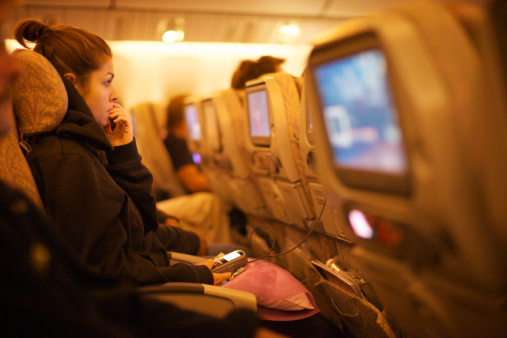
Babies are infamous for wailing on planes. But adults are plenty guilty of shedding a tear or two in-flight, and there are a few reasons why.
For people who get anxious when there is a change in environment, just arriving at an airport can signal a perceived threat to the brain, Jodi De Luca, a Colorado-based psychologist who studies the impact of high altitudes on emotions. There’s a lot that goes into simply getting on a plane, including traveling to the airport, getting through security, depositing luggage and keeping track of time. That pressure — coupled with possible thoughts of never seeing loved ones again in the rare event of a crash — adds up, no matter how much a person tries to “intellectually process it” through logic, she says.
And a mix of psychological factors related to the plane’s altitude and a perceived loss of control can cause a person to break down emotionally once in the air, DeLuca says.
“We have little control over our environment while we are traveling by plane,” De Luca says. “Although we may not be consciously aware of our emotional vulnerability, our emotional brain is working overtime.”
More from TIME
Altitude levels and the air conditions of planes can also affect people’s emotional and physical states, much like the way cabin pressure and sounds can impact taste on flights. Air pressure in flight cabins is typically about 6,000 to 8,000 feet above sea level, and the change can affect people physiologically, leading to dehydration, according to the World Health Organization.
“When you’re dehydrated, it’s not just the body that’s lacking in resources,” De Luca says. “Everything is affected”—including behavior and the brain. “Some people have difficulty self-regulating their emotions.”
The prevalence of people who say they cry on airplanes is largely anecdotal. Writer Brett Martin, who says he’s not a crier when he’s on dry land, talked in a 2011 segment during This American Life about how he was driven to tears while watching the romantic comedy Sweet Home Alabama. Other movies that weren’t particularly known for being sad, including the dramedy Bend It Like Beckham and What a Girl Wants also made him cry.
For people who have trouble crying when they’re on solid ground, the change in emotions once in the air is sometimes welcome, and can be therapeutic. The writer Hayley MacMillen said in Allure that she embraces long sob sessions on lengthy flights because she’s in a neutral zone.
“There’s an anonymity and a stillness to air travel that can feel like a license to sit with your feelings and, well, feel them,” she writes.
But that hasn’t stopped some airplanes from trying to take advantage of the phenomenon. Last year, Virgin Atlantic marketed tongue-in-cheek “emotional health warnings” ahead of certain in-flight movies like Lion or Moonlight, warning passengers to keep tissues on hand or to press a call button if they needed comforting.
A 2017 survey of passengers commissioned by London’s Gatwick Airport found that 15% of men and 6% of women are more likely to cry while watching a film on a flight than if they were to watch that movie elsewhere.
Movies can be a particular trigger for people once a plane has taken off. The darkness of a flight cabin illuminated by the small screens playing whatever an airline has to offer can make a person realize they are truly alone until landing, De Luca says. Plus, the usual brain chemicals that would manage your reactions are slightly off kilter at a higher altitude, she says.
Those interested in keeping their faces tear-free on flights should try out challenging activities to keep their brains stimulated, she recommends. “Try Sudoku or a crossword puzzle while flying,” she says. “It will make you think more and cry less.”
More Must-Reads from TIME
- Cybersecurity Experts Are Sounding the Alarm on DOGE
- Meet the 2025 Women of the Year
- The Harsh Truth About Disability Inclusion
- Why Do More Young Adults Have Cancer?
- Colman Domingo Leads With Radical Love
- How to Get Better at Doing Things Alone
- Michelle Zauner Stares Down the Darkness
Write to Mahita Gajanan at mahita.gajanan@time.com